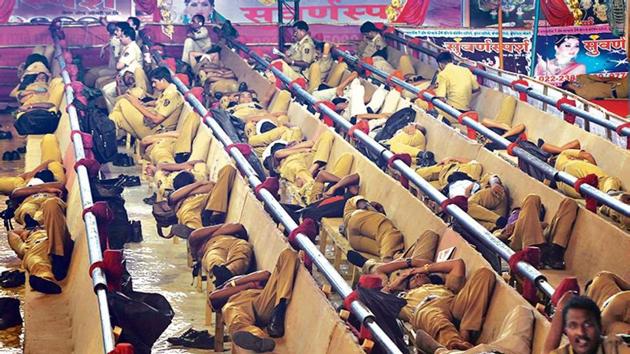Stress, apathetic attitude taking toll on policing: Study
More than one-third of police personnel would be willing to give up their profession if they were given a chance to join another job with the same salaries and perks, the survey found.
A survey conducted across 21 Indian states by non-governmental organisations Common Cause and Lokniti – Centre for the Study of Developing Societies (CSDS), has found police personnel to be under stress due to workload, poor work-life balance, and deficiency of resources. The report, which was released on Tuesday, also raises concern about the casual attitude of police personnel towards judicial processes.

More than one-third of police personnel would be willing to give up their profession if they were given a chance to join another job with the same salaries and perks, the survey found. Three in four personnel said the workload made it difficult for them to do their job well and was affecting their physical and mental health. An average police officer works for 14 hours a day, six hours more than what the Model Police Act recommends. A quarter of the respondents said they worked for more than 16 hours a day. Other than working overtime, every second police personnel reported not getting any weekly off day.

Other than poor work-life balance, the police personnel also have to work with limited resources at their disposal. Some police stations lack basic facilities such as drinking water, clean toilets, transport, staff and funds for routine purchases.

The police personnel also reported the absence of basic technological facilities such as computers – only 68% of civil police personnel reported that they always had access to a functional computer at their workplace. Roughly the same proportion reported having access to a storage facility for documents at their workplace.
The survey highlights the casual attitude of many in the police force towards judicial processes. A majority of police personnel (about three in five) believed that there should be a preliminary investigation done before registering a first investigation report (FIR), no matter how serious the reported crime is. This is in contradiction to a 2013 Supreme Court ruling which made it mandatory for the police to register an FIR if a victim discloses information about a cognisable offence. “Contributing significantly to the police’s failure in developing a people-friendly image is its inability to perform one of its core functions—register crimes,” the report states.
WATCH: METRO MATTERS | Street crimes get violent in Delhi, but top cop Amulya Patnaik has a plan
Apart from a casual attitude towards filing an FIR, every third police personnel surveyed agreed with the statement that for minor offences, a minor punishment handed down to the accused by the police was better than a legal trial. About 20% personnel agreed with the statement that killing dangerous criminals was better than a legal trail. A three-fourths majority believed it was alright for the police to adopt a violent attitude towards criminals while a greater proportion of personnel considered it justifiable to beat criminals for extracting confessions while investigating serious cases.
The survey also found that a significant proportion of police force has a casual attitude towards mob violence. The respondents were asked to what extent is it natural for a mob to punish the culprits on their own in cases involving cow slaughter, kidnapping, rape and road accidents caused by the driver’s negligence. More than one-third of respondents said it was to a large extent or somewhat natural.
The survey also found that while the police personnel were sufficiently trained on physical parameters, weaponry and in crowd control, many lacked training on modules of new technology, cybercrime or forensic technology. The survey report states that negative attitude towards registration of cases, use of violence on criminals and mob violence could be a reflection of the lack of proper and frequent training in human rights and caste sensitization. More than one in 10 personnel reported not having received training on human rights and caste sensitization.

Speaking in a panel discussion held after the survey report was released, former Supreme Court judge, Justice Jasti Chelameswar, expressed the need to impart quality training to police personnel across the country, especially in criminal law and the constitution. He narrated judicial cases from his personal experience wherein justice was hampered due to police personnel being ignorant of the laws of criminal procedure.
Retired Indian Police Service officer Prakash Singh, speaking at the event, spoke about India’s poor ranking in the Rule of Law Index by the World Justice Project, wherein India ranked 68th out of 126 countries.
He expressed need of police reforms that would immunize police force from political pressure. “Why are we at such a low position? It is not that we have the rule of law; we have the law of rulers. What they say prevails,” he said.
Neeraj Kumar, former Delhi Police commissioner, endorsed some of the findings of the survey. “Policing is becoming a thankless job and the police are increasingly finding it difficult to maintain a work-life balance. Over the years, it is becoming more and more difficult to be a law enforcer,” said Kumar.






